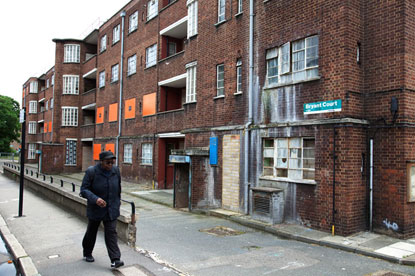Selling off vacant social housing in the most expensive parts of the England could release £4.5bn annually, a think-tank said today.
 The Ending expensive social tenancies report from the centre-Right Policy Exchange says the money could kick-start a construction boom, funding the building of 80,000–170,000 social homes a year and creating up to 340,000 jobs.
The Ending expensive social tenancies report from the centre-Right Policy Exchange says the money could kick-start a construction boom, funding the building of 80,000–170,000 social homes a year and creating up to 340,000 jobs.More than a fifth (21.8%) of England’s 3.9 million social housing stock is ‘expensive’, Policy Exchange argues, that is, worth more than the median property value for the region. London and the east of England have the highest concentrations of expensive social housing at 30.7% and 26% respectively.
The think-tank has calculated that around 3.5% of this expensive stock – around 28,500 homes – are vacated each year when tenants move on or die. Once empty, these homes should be sold on the open market. This could raise £4.5bn a year after debt secured against stock has been paid off.
Report author Alex Morton said: ‘Expensive social housing is costly, unpopular and unfair. That is why almost everybody rejects it. Social housing tenants deserve a roof over their heads, but not one better than most people can afford, particularly as expensive social housing means less social housing and so longer waiting lists for most people in need.’
But the National Housing Federation challenged Policy Exchange’s conclusions as ‘fundamentally flawed’.
Chief executive David Orr said: ‘The opportunity to sell vacant stock in high-value areas from time to time is entirely sensible.
‘The problems arise when you take a good idea to extremes. There may be a theoretical opportunity to liberate capacity – but we don’t live in a theoretical world. We live in a messy world where well-off and less well-off people live next to each other – and gain because of it. We live in a world where we don’t segment people according to their income or their class.’
Mike Jones, chair of the Local Government Association’s environment and housing board, said: ‘While selling off expensive stock to pay for more new homes may be sensible in some parts of the country, in other areas it could risk driving out key workers and undermining councils’ efforts to ensure that the demographic make-up of towns and cities is conducive to a vibrant local economy.
'In addition, we need to make sure people living in affordable housing can access jobs, education and other opportunities to avoid concentrations of unemployment and disadvantage.’





















